-
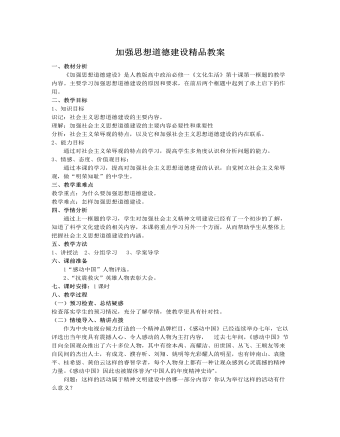
人教版高中政治必修3加强思想道德建设精品教案
一、教材分析《加强思想道德建设》是人教版高中政治必修一《文化生活》第十课第一框题的教学内容。主要学习加强思想道德建设的原因和要求,在前后两个框题中起到了承上启下的作用。二、教学目标1、知识目标识记:社会主义思想道德建设的主要内容。理解:加强社会主义思想道德建设的主要内容必要性和重要性分析:社会主义荣辱观的特点,以及它和加强社会主义思想道德建设的内在联系。 2、能力目标通过对社会主义荣辱观的特点的学习,提高学生多角度认识和分析问题的能力。3、情感、态度、价值观目标:通过本课的学习,提高对加强社会主义思想道德建设的认识,自觉树立社会主义荣辱观,做“明荣知耻”的中学生。三、教学重难点教学重点:为什么要加强思想道德建设。教学难点:怎样加强思想道德建设。
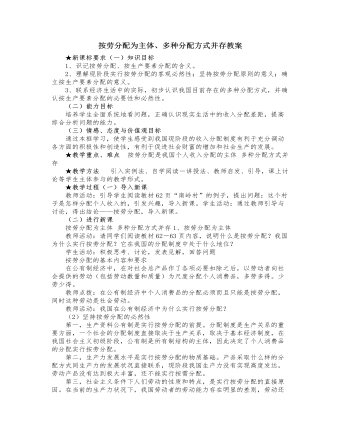
人教版高中政治必修1按劳分配为主体、多种分配方式并存教案
(3)确立按生产要素分配的意义确立按生产要素分配的原则,是对市场经济条件下各种生产要素所有权存在的合理性、合法性的确认,体现了国家对公民权利的尊重,对劳动、知识、人才、创造的尊重。有利于让一切生产要素的活力竞相迸发,让一切创造社会财富的源泉充分涌流,以造福人民。(三)课堂总结、点评 通过这节课的学习,我们懂得了在我国社会主义初级阶段,实行以按劳分配为主体、多种分配方式并存的制度,把按劳分配和按生产要素分配结合起来具有客观必然性,也有重要的意义。★课余作业 组织学生撰写社会调查报告,要求学生调查自己家里的收入情况,分清哪些收入是按劳分配所得,哪些是非按劳分配收入,并进一步分析现在的收入形式与以前相比有哪些变化,这种变化给家庭的生活带来哪些影响?★教学体会本节内容是与学生生活实际密切联系的内容,在学习中应该多引入日常生产、生活中常见的一些实例,让学生去深刻理解这些知识,并能够从自己的实践中理解、把握我国分配政策的合理性。
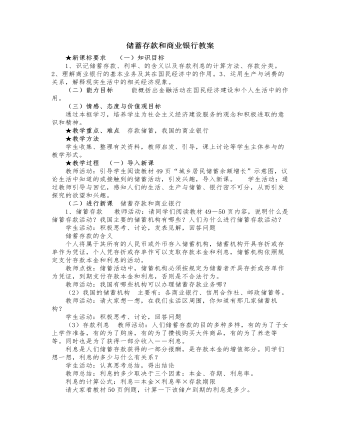
人教版高中政治必修1储蓄存款和商业银行教案
第三、结算业务结算业务时商业银行为社会经济活动中的货币收支提供手段与工具的服务。银行从中收取一定的服务费用。除上述三大业务外,商业银行还可以提供债券买卖与兑付、代理买卖外汇、代理保险、提供保管箱等其他服务。教师活动:商业银行在我国经济建设中具有巨大作用。请同学们看教材52页专家点评。学生活动:阅读课本,认真总结,得出结论(三)课堂总结、点评 这节课我们重点学习了储蓄存款和商业银行的有关知识,知道了储蓄存款活动程序、主要机构、特点和利息的计算等常识,了解了各种商业银行主要业务及其作用。这对于我们在日常生活中正确地办理金融储蓄业务将有重大指导作用。★课余作业 组织学生到附近银行、企业、居民中,咨询银行信贷活动的程序及原则要求,并亲自到商业银行办理一次存款和取款活动。

人教版高中政治必修3加强思想道德建设教案
学生活动三:让学生阅读教材P108回答:(投影显示,然后让学生对这两个概念进行比较)总的说,法治与德治是相辅相成、相互促进的。设计意图:让学生弄清法治与德治的区别,并理解法治与德治的联系。教师过渡:(提问)我们进行思想道德建设的两个宝贵资源是什么?这又说明社会主义思想道德体系建设应与什么相承接?(3)社会主义思想道德体系应该与中华民族传统美德相承接①传统美德是中华传统道德中的精华学生活动四:列举中华民族的传统美德②今天倡导的基本道德规范是对中华民族传统美德的继承、发展和创新教师活动:(投影显示)我国《公民道德实施纲要》提出了20个字的基本道德规范。可以具体分为10个方面:爱国守法明礼诚信团结友善勤俭自强敬业奉献教师过渡:在我们的社会主义社会里,是非、善恶的界限绝对不能混淆,坚持什么、反对什么,倡导什么、抵制什么,都必须旗帜鲜明。所以我们必须树立社会主义荣辱观。(4)树立社会主义荣辱观——八荣八耻
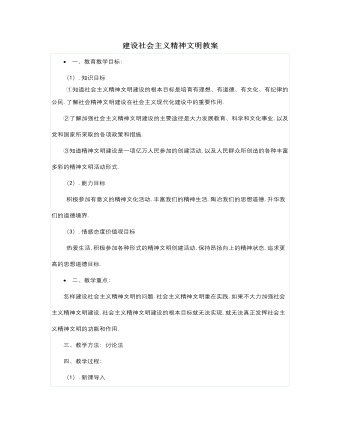
人教版高中政治必修3建设社会主义精神文明教案
师:三亚目前正在强调打造文化产业,如举办文体大赛,提升三亚知名度.如今"美丽三亚,浪漫天涯"已成为三亚一张旅游名片,以文化产业的发展带动经济旅游的发展,大家结合今天的三亚文化产业发展谈谈发展文化事业和文化产业的作用.学生:回答(略)。师:要支持文化产业发展,增强我国文化产业的整体实力和竞争力.? 3. 亿万人民的创建活动(板书) (1).人民群众是精神文明创建活动的主体。学生朗读课文P103页,理解亿万人民是精神文明创建活动的主体.师:发展先进文化,本质上是一个立足于建设中国特设社会主义伟大实践而不断进行文化创造的过程,也就是社会主义精神文明的创建过程.(2).人民群众参与精神文明创建活动的意义.师:人民群众在社会主义精神文明建设活动中,创造了丰富多彩的形式,在参与的过程中思想感情得到熏陶,思想觉悟得到启发,精神生活得到充实,道德意识得到增强,道德境界得到升华.这对整个中华民族的精神面貌,正在产生不可估量的积极影响.
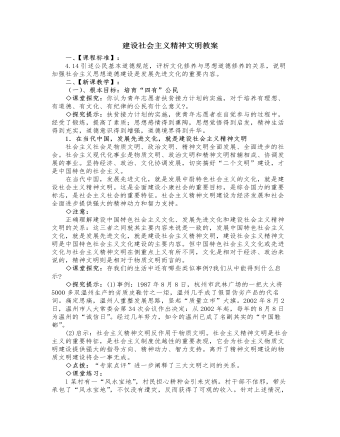
人教版高中政治必修3建设社会主义精神文明教案
(2)伟大的意义:这些精神文明创建活动,是人民群众“移风易俗”、改造社会的伟大创造,也是人民群众自我教育、自我提高的有效途径。各具特色的精神文明创建活动,使人们在自觉参与的过程中思想感情得到熏陶,思想觉悟得到启发,精神生活得到充实,道德意识得到增强,道德境界得到升华。这对整个中华民族的精神面貌,正在产生不可估量的积极影响。◇点拨:“相关链接”描述了青年志愿者活动,引导学生感悟其精神,升华道德境界,增强参与意识。(3)必然的选择:投身于社会主义精神文明建设的伟大实践,做新时期中国先进文化的传播者和建设者,是当代中国青年成长、成才的必然选择。◇拓展延伸:在群众性精神文明创建活动中涌现出的先进人物和英雄模范,像孔繁森、张海迪、徐洪刚、韩素云、李国安、徐虎、李素丽等,在全社会起到了良好的示范作用;提出的一些响亮口号,如“从我做起,从现在做起”“岗位学雷锋,行业树新风”“单位做个好职工,社会做个好公民,家庭做个好成员”等,不断激励着人们。
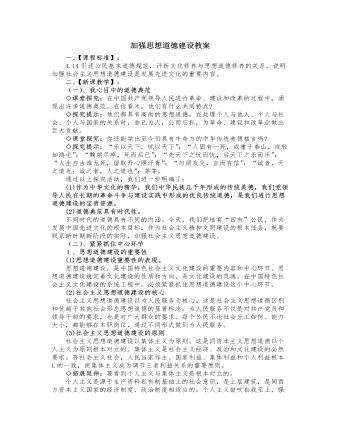
人教版高中政治必修3加强思想道德建设教案
(2)社会主义思想道德体系应该与社会主义法律规范相协调。法治和德治,从来都是相辅相成、相互促进的。法治以法律的权威性和强制性规范社会成员的行为;德治以道德的说服力和感召力提高社会成员的思想认识和道德觉悟。建设中国特色社会主义,既要加强社会主义法制建设,依法治国;也要加强社会主义思想道德建设,以德治国。◇课堂探究:你能否引述与上述道德规范相关法律条文。◇探究提示:上述道德规范见诸很多法律当中,例如:2O()5年4月27日颁布的《中华人民共和国公务员法》规定:公务员应当“忠于职守,勤勉尽责,服从和执行上级依法作出的决定和命令”“遵守纪律,恪守职业道德,模范遵守社会公德。”修订后的《中华人民共和国婚姻法》规定:“夫妻应当互相忠实,互相尊重;家庭成员间应当敬老爱幼,互相帮助,维护平等、和睦、文明的婚姻家庭关系。”
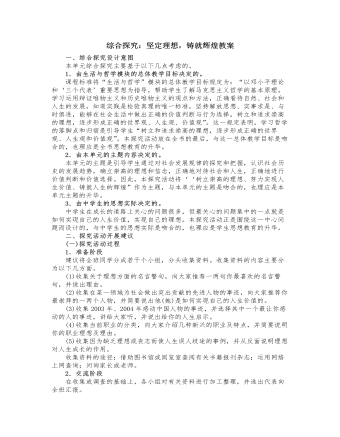
人教版高中政治必修4综合探究:坚定理想,铸就辉煌教案
理想扎根在实践的土壤中理想当然是重要的,但是不能把理想当成幻想或空想,理想必须扎根在实践的土壤中。青年人充满激情,这是非常重要的。古人有句话:“哀莫大于心死”。最大的悲哀就是没有追求,就像一团火焰熄灭了一样,即使到了我这个年纪也不能“哀莫大于心死”。青年人都有很高的激情,这是很好的。但是青年的激情往往不大稳定,过去人们说青年人的热情是“三分钟的热度”。这句话不一定准确,但青年人在这一点上应该有一个正确的认识。记得我大学毕业时,对于走向社会、走向生活充满了幻想,认为生活中的一切都是美好的,是典型的理想主义者,因此,对自己不能正确的估价,好高骛远,只愿做大事,不愿也不注意从小事积累。列宁说过,大事是由小事积累而成的。我当初毕业时,一方面充满了激情,另一方面也确实过高地估计了自己。
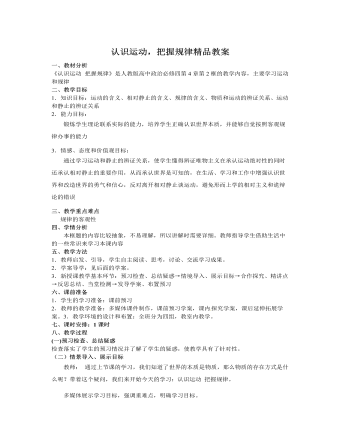
人教版高中政治必修4认识运动,把握规律精品教案
一、教材分析 《认识运动 把握规律》是人教版高中政治必修四第4章第2框的教学内容,主要学习运动和规律二、教学目标1.知识目标:运动的含义、相对静止的含义、规律的含义、物质和运动的辨证关系、运动和静止的辨证关系2.能力目标: 锻炼学生理论联系实际的能力,培养学生正确认识世界本质,并能够自觉按照客观规律办事的能力3.情感、态度和价值观目标:通过学习运动和静止的辨证关系,使学生懂得辨证唯物主义在承认运动绝对性的同时还承认相对静止的重要作用,从而承认世界是可知的,在生活、学习和工作中增强认识世界和改造世界的勇气和信心,反对离开相对静止谈运动,避免形而上学的相对主义和诡辩论的错误三、教学重点难点规律的客观性四、学情分析本框题的内容比较抽象,不易理解,所以讲解时需要详细。教师指导学生借助生活中的一些常识来学习本课内容
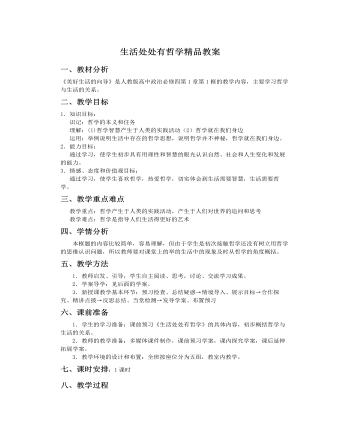
人教版高中政治必修4生活处处有哲学精品教案
(三)合作探究、精讲点拨。探究一:探究问题:如何看待排名一名高中生在谈到“排名的二重性”时说:“我们既不能盲目地张扬排名,也不能简单地否定排名。作为学生,如果用片面的观点对待排名,排在前面沾沾自喜、骄傲自满,排在后面灰心丧气、一蹶不振,就会停滞不前,甚至倒退;如果通过排名了解自己的学习实力以及同别人的差距,做到知彼知己,扬长避短,就会出现先进更先进、后进赶先进的生动局面。”问题:(1)在排名问题上,人们的看法往往各不相同,这是为什么?(2)为什么我们应看到排名的“二重性”?(3)联系生活中类似的事例,谈谈生活与哲学的关系。教师活动:指导学生阅读以上的材料,并思考所提问题。学生活动:阅读材料,分组讨论问题,发表自己的观点,分析材料中包含的哲学道理。教师点评:(1)在排名问题上,人们的看法不同,主要是因为人们的思维方法不同。

新人教版高中英语必修1Unit 3 Sports and Fitness-Listening and Speaking & Listening and Talking教案
Finally, after finishing the task above, the teacher is expected to instruct students to work in groups to finish the following project:Speaking ProjectWhat event or activity would you like to invite your friend to? Make a conversation with a partner.Ski Race: Zhangjiakou, a beautiful city in northern China, will host the Youth Ski Race in December.Track Meet: a great event for track –and –field lovers on 26 October.Gym Class: come and work out at a gym! You can make it.Part 2: Listening and Talking:The teacher is advised to talk with their new students about the related topic: Boys and girls , what do you think of sportsmanship? Let’s listen and find out:Play the listening and match each opinion with the right speaker. Who do you agree with? Why?Cao Jing _____________ Lily _____________ Max _____________A. An athlete should do his/her best to win.B. The girl should stop and help the other girl. Good sportsmanship is more important than wining!C. An athlete should think about honor and his/her fans if he/she is competing for his/her country.Listen again and circle the expressions that you hear in the conversation.

新人教版高中英语必修3Unit 1 Festivals and celebrations-Discovering Useful Structure教学设计
4.That was an experience that frightened everyone. →That was _____________________. 答案:1. taking 2. being discussed 3. in the reading room 4. a frightening experienceStep 6 The meaning and function of V-ing as the predicative动词-ing形式作表语,它通常位于系动词后面,用以说明主语“是什么”或“怎么样”一种表示主语的特质、特征和状态, 其作用相当于形容词; 另一种具体说明主语的内容, 即主语等同于表语, 两者可互换。The music they are playing sounds so exciting. 他们演奏的音乐听起来令人激动。The result is disappointing. 结果令人失望。Our job is playing all kinds of music. 我们的工作就是演奏各种音乐。Seeing is believing. 眼见为实。Step 7 Practice1. It is ________(amaze) that the boy is able to solve the problem so quickly.2. Buying a car is simply _______(waste) money. 3. Please stop making the noise—it’s getting ________(annoy). 4. complete the passage with the appropriate -ing form.La Tomatina is a festival that takes place in the Spanish town Bunol every August. I think many food festivals are __________ because people are just eating. however, this festival is _________ because people don't actually eat the tomatoes. Instead, they throw them at each other! the number of people ________ part in this tomato fight, can reach up to 20,000, and it is a very __________ fight that lasts for a whole hour. The _______ thing is how clean Bunol is after the tomatoes are washed away after the fight. this is because the juice form tomatoes is really good for making surfaces clean!答案:1. amazing 2. wasting 3. annoying4. boring interesting taking exciting amazing

新人教版高中英语必修3Unit 1 Festivals and Celebrations-Reading for writing教学设计二
Step 3 Analyzing article structureActivity 31. Teachers raise questions to guide students to analyze the chapter structure of this diary and think about how to describe the festival experience. (1)What should be included in the opening/body/closing paragraph(s)?(2)How did the writer arrange his/her ideas?(3)What kind of interesting details did the writer describe?(4)How did the writer describe his/her feelings/emotions during the event?2. Students read and compare the three sentence patterns in activity 2. Try to rewrite the first paragraph of the diary with these three sentence patterns. After that, students exchange corrections with their partners. Such as:●This was my first time spending three days experiencing the Naadam Festival in China’s Inner Mongolia Autonomous Region and it was an enjoyable and exciting experience. ●I'll never forget my experience at the Naadam Festival because it was my first time to watch the exciting Mongolian games of horse racing, wrestling, and archery so closely. ●I'll always remember my first experience at the Naadam Festival in China’s Inner Mongolia Autonomous Region because it was so amazing to spend three days witnessing a grand Mongolian ceremony. Step 4 Accumulation of statementsActivity 41. Ask the students to read the diary again. Look for sentences that express feelings and emotions, especially those with the -ing form and the past participle. Such as:● …horse racing, wrestling, and archery, which are all so exciting to watch. ● some amazing performances● I was surprised to see…● I was a little worried about. . . ● feeling really tiredOther emotional statements:●I absolutely enjoyed the archery, too, but the horse races were my favourite part. ●I'm finally back home now, feeling really tired, but celebrating Naadam with my friend was totally worth it. ●He invited me back for the winter to stay in a traditional Mongolian tent and cat hot pot. I can’t wait!2. In addition to the use of the -ing form and the past participle, the teacher should guide the students in the appreciation of these statements, ask them to memorize them, and encourage them to use them reasonably in writing practice.

新人教版高中英语必修3Unit 1 Festivals and Celebrations-Reading for Writing教学设计一
The topic of this part is “Write about your festival experience”.During the Listening and Speaking and Talking, students are just asked to say out their festival experiences such as the Spring Festival, Mid-autumn Day, but this part students will be asked to write down their own festival experiences. During the reading part, it introduces the Naadam Festival in Inner Mongolia Autonomous Region, which can give students a good example to imitate. Students not only learn the festival, but touch and feel the Inner Mongolian’s character, the spirit and cultural atmosphere, which can help students form the cultural awareness and learn to enjoy and value the diversity of Chinese culture.Concretely, the dairy tells the experience that the author spent the Naadam Festival in Inner Mongolia Autonomous Region with his/her friend. The structure is clear. In the opening paragraph, it introduces the topic of the Naadam Festival and the whole feeling. Then it introduces the items of the festival like the ceremony, wrestling and horse racing. Finally, it summarizes this experience. Because this part is a travel journal, we must guide students pay more attention to these details: 1. use the first person. 2. use the past tense to tell the past thing and use the present or future tense to describe the scenery. 3. use the timeline to tell the development. 4. be careful for the author’s psychology, emotion and feeling, etc.1. Read quickly to get main idea; read carefully to get the detailed information about Naadam Festival.2. Learn the structure of the reading article and language.3. Write an article about a festival experience4. Learn to use the psychology, emotions and feeling in the writing.1. Write an article about a festival experience.2. Use the structure of the reading article and language.

新人教版高中英语必修3Unit 3 Diverse Cultures-Discovering Useful Structure教学设计
Step 4 PracticeRead the conversation. Find out which words have been left out.Justin: Linlin, I’m going to Guizhou Province next month. I’m super excited! Any recommendations for places to visit?Linlin: Wow, cool! Guizhou is a province with a lot of cultural diversity. Places to visit...well, definitely the Huangguoshu Waterfall first.Justin: What’s special about the waterfall?Linlin: Well, have you ever heard of the Chinese novel Journey to the West ?Justin: Yes, I have. Why ?Linlin: In the back of the waterfall, you will find a cave, which is the home of the Monkey King.Justin: Really? Cool! I’ll definitely check it out.Linlin:And I strongly recommend the ethnic minority villages. You’ll find Chinese culture is much more diverse than you thought.Justin:Sounds great, thanks.Answers:Justin: Linlin, I’m going to Guizhou Province next month. I’m super excited! Do you have any recommendations for places to visit?Linlin: Wow, that’s cool! Guizhou is a province with a lot of cultural diversity. What are some places to visit in Guizhou ? Well, definitely the Huangguoshu Waterfall is the first place to visit in Guizhou Province.Justin: What’s special about the waterfall?Linlin: Well, have you ever heard of the Chinese novel Journey to the West ?Justin: Yes, I have heard of the Chinese novel Journey to the West . Why do you ask if I have heard of the Chinese novel Journey to the West?Linlin: In the back of the waterfall, you will find a cave, which is the home of the Monkey King from Journey to the West.Justin: That’s really true? It’s Cool! I’ll definitely check it out.Linlin:And I strongly recommend the ethnic minority villages on your trip to Guizhou Province. You’ll find Chinese culture is much more diverse than you thought it was.Justin:This all sounds great, thanks.

新人教版高中英语必修3Unit 3 Diverse Cultures-Listening &Speaking&Talking教学设计
1. In Picture 1 and Picture 2, where do you think they are from? How do you know?From their wearings, we can know they are from ethnic minority of China--- Miao and Dong.Picture 1, they are playing their traditional instrument lusheng in their traditional costumes.Picture 2. the girls are Miao because they wear their traditional costumes and silver accessory.2. In Picture 3, can you find which village it is? What time is it in the picture?It is Dong village. It is at night. Step 2 While-listeningJustin met a new friend while traveling in Guizhou. Listen to their conversation and complete the summaries below.Part 1Justin and Wu Yue watched some Miao people play the lusheng. The instrument has a history of over 3,000 years and it is even mentioned in the oldest collection of Chinese poetry. Then they watched the lusheng dance. Justin wanted to buy some hand-made silver/traditional accessories as souvenirs. He was told that the price will depend on the percentage of silver. Part 2They will go to a pretty Dong minority village called Zhaoxing. they will see the drum towers and the wind and rain bridges. They may also see a performance of the Grand Song of the Dong people.Step 3 Post-listening---TalkingWork in groups. Imagine Justin is telling some friends about his trip to Guizhou. One of you is Justin and the rest of you are his friends. Ask Justin questions about his trip and experience. The following expressions may help you.

新人教版高中英语必修3Unit 3 Diverse Cultures-Reading and Thinking教学设计
Discuss these questions in groups.Q1: Have you ever been to a place that has a diverse culture ? What do you think about the culture diversity ?One culturally diverse place that I have been to is Harbin, the capital city of Heilongjiang Province. I went there last year with my family to see the Ice and Snow Festival, and I was amazed at how the culture as different to most other Chinese cities. There is a big Russian influence there, with beautiful Russian architecture and lots of interesting restaurants. I learnt that Harbin is called “the Oriental Moscow” and that many Russians settled there to help build the railway over 100 years ago.Q2: What are the benefits and challenges of cultural diversity ?The benefits: People are able to experience a wide variety of cultures, making their lives more interesting, and it can deepen the feelings for our national culture, it is also helpful for us to learn about other outstanding culture, which helps improve the ability to respect others. The challenges: People may have trouble communicating or understanding each other, and it may lead to disappearance of some civilizations and even make some people think “The western moon is rounder than his own.”Step 7 Post reading---RetellComplete the passage according to the text.Today, I arrived back in San Francisco, and it feels good (1) _____(be) back in the city again. The city succeeded in (2)_________ (rebuild) itself after the earthquake that (3)________ (occur) in 1906, and I stayed in the Mission District, enjoying some delicious noodles mixed with cultures. In the afternoon, I headed to a local museum (4)____ showed the historical changes in California. During the gold rush, many Chinese arrived, and some opened up shops and restaurants in Chinatown to earn a (5)_____ (live). Many others worked on (6)______ (farm), joined the gold rush, or went to build the railway that connected California to the east. The museum showed us (7)____ America was built by immigrants from (8)________ (difference) countries and cultures. In the evening, I went to Chinatown, and ate in a Cantonese restaurant that served food on (9)________(beauty) china plates. Tomorrow evening, I’m going to (10)__ jazz bar in the Richmond District. 答案:1. to be 2. rebuilding 3. occurred 4. that 5.living6. farms 7.how 8. different 9. beautiful 10. a

新人教版高中英语必修3Unit 4 Space Exploration-Discovering Useful Structure教学设计
The theme of the section is “Describe space facts and efforts to explore space”. Infinitives are one of non-finite verbs, as the subjects, objects, predicative, attributes and adverbials. This unit is about space exploration, which is a significant scientific activity, so every scientific activity has strong planning. Therefore, using the infinitives to show its purpose, explanations or restrictions is the best choice.1. Learn the structure, functions and features of infinitives.2. Learn to summarize some rules about infinitives to show purpose and modify.3. Learn to use infinitives in oral and writing English. 1. Learn the structure, functions and features of infinitives.2. Learn to summarize some rules about infinitives to show purpose and modify.3. Learn to use use infinitives in oral and writing English.Step 1 Lead in---Pair workLook at the following sentences and focus on the italicized infinitives. In pairs, discuss their functions. 1. I trained for a long time to fly airplanes as a fighter pilot..(作目的状语)2. As we all know, an astronaut needs to be healthy and calm in order to work in space..(作目的状语)3. First of all, you must be intelligent enough to get a related college degree..(作目的状语)4. Some scientist were determined to help humans realise their dream to explore space..(作定语)5. On 12 April 1961, Yuri Gagarin became the first person in the world to go into space..(作定语)Summary:1. 不定式的结构:to+do原形。2. 分析上面的句子,我们知道在描述太空探索时,动词不定式不仅可以用来表目的,还可以用来作定语,表修饰。

新人教版高中英语必修3Unit 4 Space Exploration-Listening&Speaking&Talking教学设计二
The themes of this part are “Talk about how to become an astronaut” and “Talk about life in space”. As Neil Armstrong said “Mystery creates wonder and wonder is the basis of man’s desire to understand. Space is difficult for human to reach, therefore, humans are full of wonders about it. However, if wanting to achieve the dream of reaching the Moon, some of our human should work hard to be an astronaut at first. Part A(Talk about how to become an astronaut) is a radio interview in a radio studio, where the host asked the Chinese astronauts about his story how to become an astronaut. Yang Liwei told his dreamed to be an astronaut since childhood. Then he worked hard to get into college at 22. The next 10 years, he gradually became an experienced pilot. At the same time, to be an astronaut, he had to study hard English, science and astronomy and trained hard to keep in good physical and mental health and to practise using space equipment. Part B (Talk about life in space) is also an interview with the astronaut Brown, who is back on the earth. The host Max asked about his space life, such as his emotion about going back the earth, the eating, shower, brushing, hobbies and his work. Part A and Part B are interviews. So expressing curiosity about the guests’ past life is a communicative skill, which students should be guided to learn.1. Students can get detailed information about how Yang Liwei became an astronaut and Max’s space life.2. Students learn to proper listening strategy to get detailed information---listening for numbers and taking notes.3. Students can learn related sentences or phrases to express their curiosity like “ I wish to know...” “I’d love to know...”4. Students can learn more about the space and astronauts, even be interested in working hard to be an astronaut

新人教版高中英语必修3Unit 4 Space Exploration-Reading and Thinking教学设计二
The theme of this unit focuses on “space exploration.” Students will learn about the training and experience needed to become an astronaut. The text is mainly about the development of space exploration. On the one hand, the text helps students to have a good understanding about the great feats humans have achieved, on the other hand, they will further understand the contributions that we Chinese have achieved, and feel confident and proud about our homeland and strengthen their love for our country. The teacher should instruct students to aim high and study harder to make great progress in the space career if possible.1. Read about the development and value of space exploration.2. Explore the mysteries of the universe and the achievements in space exploration.3. Skillfully use the vocabulary of this text to cultivate self-study ability 4. Develop cooperative learning ability through discussion.1. Enable the Ss to talk about the development and value of space exploration.2. Guide the Ss to summarize the main idea of each paragraph as well as the main idea of the text.3. Help Ss comprehend the main reasons for space exploration. Multi-media, textbook, notebooks.Step 1: Warming up and predictionLook at the title and the pictures of the text and predict what the text will be about?2. What are the main reasons for space exploration?

